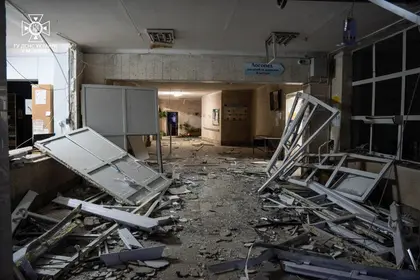There have been more than 1000 verified Russian attacks on health care facilities in Ukraine since the full-scale invasion, the World Health Organization (WHO) has said, a statistic it says is a "grim milestone" and represents the highest number ever recorded in any humanitarian emergency.
The WHO statement released on Wednesday aid that the 1004 verified attacks over the past 15 months of full-scale war had claimed the lives of at least 101 health workers and patients, and injured many more.
JOIN US ON TELEGRAM
Follow our coverage of the war on the @Kyivpost_official.
“These attacks threaten the safety and well-being of health workers and undermine care for people living close to conflict areas,” said Dr Jarno Habicht, WHO Representative in Ukraine.
“Attacks on health care are a violation of international humanitarian law. They deprive people of the care they need and have wide-ranging, long-term consequences,” he said.
Habicht outlined how such attacks impacted the healthcare system on multiple levels.
Firstly, they “rob entire communities of essential health services that are needed to save lives, leading to increased illness and death.”
Secondly, “the psychological effect on patients scared to seek health care, and on health workers unable to provide care in safe and protected environments, are also significant, and will impact the health of the population for long periods.”
The Ukrainian government reported to a recent World Health Assembly that 177 health facilities had been reduced to rubble and more than 1,250 health facilities had been damaged to date.

N. Korean Troops Massed in Russia to Enter Ukraine War ’Soon’: Pentagon Chief
Some healthcare facilities have now been restored or rebuilt, such as the family health clinic in Makariv, some 60 kilometers to the west of Kyiv.
Prior to the reconstruction, Pavlo Kovtyniuk, a healthcare NGO leader and former Assistant Minister for Health, and this Kyiv Post journalist inspected the site and established that the original clinic had been intentionally destroyed in March 2022 by a Russian mortar team firing from approximately 1.2 kilometers away.
The Kyiv School of Economics estimates that $1.7 billion is needed to restore damaged or rebuild destroyed health facilities alone in Ukraine.
According to its statement, WHO has been monitoring and responding to health needs in the regions most affected by fighting in the east and south of the country. Health facilities in the most affected areas, including Kherson, Kharkiv, Zaporizhzhia and Donetsk, have reported limitations imposed by a lack of security and structural damage. However, a high percentage of health facilities in these regions remain partially functional and accessible, as they continue to operate in damaged amenities.
WHO data, identifies significant challenges in the provision of specialized services, such as chemotherapy and mammography, due to a lack of staff and medical equipment. Some regions also face difficulties in providing highly-skilled childbirth services.
Although primary health-care remains widely available, even in war-affected regions, health costs have been increasing in the past half-year. Surveys conducted by the WHO indicate that nearly a third of the population is finding it difficult to afford certain health services.
However, WHO also sounds some positive notes in its statement.
“The fact that the health system in Ukraine continues to operate amid such circumstances is a testament to the heroic dedication of health-care workers,” Habicht said.
“Ukraine’s health-care workers remain amazingly strong, brave and patient, day after day, saving lives and providing care to those in need,” he said.
In late May, WHO member states voted overwhelmingly in favor of a resolution condemning Russia’s aggression and its impact on Ukrainians’ health and health care, by 80 votes to nine, with 52 abstentions.
You can also highlight the text and press Ctrl + Enter






